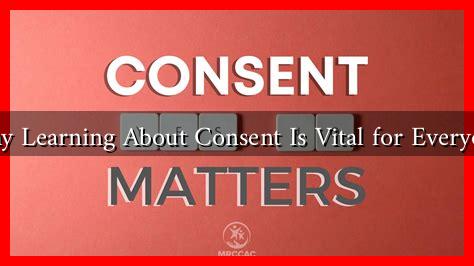-
Table of Contents
Why Learning About Consent Is Vital for Everyone
Consent is a fundamental aspect of human interaction, yet it is often misunderstood or overlooked. In recent years, the conversation around consent has gained momentum, particularly in the context of sexual relationships. However, the importance of understanding consent extends far beyond this realm. This article explores why learning about consent is vital for everyone, regardless of age, gender, or background.
The Definition of Consent
At its core, consent is the agreement between participants to engage in a specific activity. It is essential that this agreement is informed, voluntary, and revocable at any time. Understanding the nuances of consent can help prevent misunderstandings and promote healthier relationships.
Why Consent Matters
Learning about consent is crucial for several reasons:
- Empowerment: Understanding consent empowers individuals to express their boundaries and desires clearly.
- Prevention of Abuse: A solid grasp of consent can help prevent sexual assault and other forms of abuse.
- Healthy Relationships: Consent fosters mutual respect and understanding, which are essential for healthy relationships.
- Legal Implications: Knowledge of consent is vital in understanding the legal ramifications of sexual activity.
Statistics Highlighting the Need for Consent Education
Statistics reveal a troubling reality regarding consent and sexual violence:
- According to the Rape, Abuse & Incest National Network (RAINN), an American is sexually assaulted every 68 seconds.
- Research from the National Sexual Violence Resource Center indicates that 1 in 5 women and 1 in 71 men will be raped at some point in their lives.
- A study published in the Journal of Interpersonal Violence found that 63% of college students did not understand the concept of consent.
These statistics underscore the urgent need for comprehensive consent education to equip individuals with the knowledge and skills to navigate relationships safely and respectfully.
Consent Beyond Sexual Relationships
While much of the discourse around consent focuses on sexual activity, it is essential to recognize that consent applies to various aspects of life, including:
- Personal Boundaries: Understanding and respecting personal space and boundaries in everyday interactions.
- Emotional Consent: Recognizing the importance of consent in sharing personal feelings and experiences.
- Digital Consent: Navigating consent in the digital age, including sharing images and personal information online.
Case Studies: The Impact of Consent Education
Several organizations and educational institutions have implemented consent education programs with positive outcomes:
- University Programs: Many universities have introduced mandatory consent workshops for incoming students, resulting in increased awareness and a decrease in reported sexual assaults.
- Community Initiatives: Local organizations have developed outreach programs that educate young people about consent, leading to healthier relationships among teens.
These case studies demonstrate that proactive education can lead to significant changes in attitudes and behaviors regarding consent.
How to Educate Yourself and Others About Consent
Here are some effective ways to learn about and promote consent:
- Attend Workshops: Participate in workshops or seminars focused on consent education.
- Read Books and Articles: Explore literature that discusses consent, such as “The Consent Guidebook” by Kelsey M. H. and “We Believe You” by the University of California.
- Engage in Conversations: Talk openly with friends and family about the importance of consent and share resources.
- Utilize Online Resources: Websites like [RAINN](https://www.rainn.org) and [The National Sexual Violence Resource Center](https://www.nsvrc.org) offer valuable information and resources.
Conclusion
Understanding consent is vital for fostering respectful and healthy relationships in all areas of life. By educating ourselves and others about the importance of consent, we can empower individuals, prevent abuse, and create a culture of respect and understanding. The statistics and case studies presented highlight the urgent need for comprehensive consent education. As we move forward, let us commit to making consent a priority in our conversations and interactions, ensuring that everyone understands their rights and responsibilities in any relationship.

